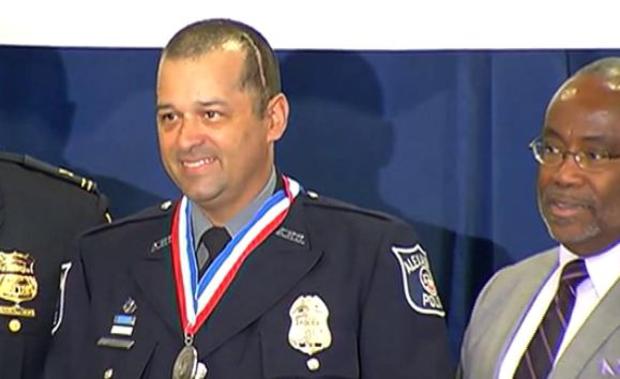
It was a horrific crime.
Voices inside Kashif Bashir’s head were saying his brain was being reprogrammed. If he wanted to reach a higher state of consciousness, he needed to commit three violent acts – a robbery, a rape, and the shooting of a police officer.
The 29-year-old cabdriver bought a pistol and drove to a shop in a Washington D.C. suburb where he intended to rape an employee. She persuaded him to leave the store and then locked the door after he did. He returned the next day and noticed a police officer inside the shop.
The shop employee told Alexandria Officer Peter Laboy about Bashir’s strange behavior. The 46-year-old officer gestured to Bashir who was in his cab, but rather than stopping, the cab driver fled. Officer Laboy went after him and when Bashir finally stopped his vehicle, he emerged from behind the wheel with a pistol and shot Laboy before he could dismount from his motorcycle. The bullet struck the father-of-four in his skull. Bashir sped away, leaving Laboy critically wounded. Bashir was caught after he crashed his taxi.
Miraculously, Officer Laboy survived but not without lasting damage. He has a traumatic brain injury.
Bashir was forced to take medication in jail so he could be made competent to stand trial. Knowing that jurors rarely believe an insanity defense, Bashir’s attorney requested a trial before a judge. The case ended-up on Alexandria Circuit Court Judge James C. Clark’s docket.
Bashir was diagnosed with paranoid schizophrenia. Commonwealth Prosecutor Bryan Porter didn’t dispute that, but he argued that Bashir was tailoring his behavior to fit the insanity defense. The cabdriver’s actions were “so planned and predatory that they belie the term criminal insanity,” he said.
Forensic psychologist William Stejskal testified that Bashir did not understand what he was doing at the time of the shooting because of his mental illness. He “believed that something else entirely was taking place.” He thought Laboy would reappear elsewhere. Bashir’s family testified about his traumatic childhood and deteriorating mental state.
A former police officer himself, Prosecutor Porter told Judge Clark that Bashir had not appeared mentally unbalanced when he was buying a handgun. After shooting Laboy, Bashir had been mentally aware enough flee from the police, which suggested he recognized the difference between right and wrong.
After reviewing the testimony, Judge Clark ruled that Bashir was insane at the time he shot Officer Laboy. Bashir was remanded to state mental health officials.
Comments posted in response to a news story about the trial written by Washington Post reporter Matt Zapotosky were predictably critical. One writer suggested the police should be slow in responding if Judge Clark or his family need help in the future.
Shootings of police officers always are heartbreaking, especially this one. What happened to Officer Laboy is awful.
But Judge Clark made the right call.
A common misconception is that individuals with mental illnesses are always out-of-control and acting oddly. This simply isn’t true. I have interviewed countless individuals who appear quite normal but are hearing voices and delusional. I didn’t think one young man was ill until he began telling me about “mazers” the CIA was firing into his head. Many homeless, severely ill individuals know where to go for meals, shelter, and which library will permit them to come inside from the cold if they sit quietly and don’t disturb others. The fact that Bashir could appear calm when buying a gun isn’t that surprising. Nor do I believe his fleeing after shooting Officer Laboy suggests that he understood right from wrong. I remember meeting a psychotic inmate who’d murdered a close friend because his mind told him an alien had entered his friend’s body. The police were aliens too so, of course, he ran from them.
Another common misconception is that defendants who are found insane have beaten the system. Had Bashir been convicted, he would have been sentenced to prison for a fixed term. While there, he would not have received any meaningful treatment. After he completed his prison term, he would have been released without any restrictions or monitoring. Plus, he would have been sicker than when he was sentenced.
Because Bashir was ruled insane, he will be sent to a locked state mental facility where he will be evaluated, medicated, and required to attend 20 hours of treatment a week. He will not be discharged — if he ever is — until a Virginia judge (not a doctor) decides that he no longer poses a threat. Even then he will be discharged under strict conditions and monitoring. Chances are Bashir will be filled with remorse once he is well enough to comprehend what he has done
Judge Clark could have bowed to political pressure. Neither Bashir nor his family appeared to be wealthy nor did they seem politically connected. Instead, Judge Clark followed the law.
His decision doesn’t diminish the horrific harm done to Officer Laboy.. As Judge Clark stated, “To characterize this case as a tragedy, I would suggest, grossly understates the facts.” But the judge’s decision was not only the most humane, it was the most effective at protecting the public. What Judge Clark did was administer justice rather than vengeance.
That takes courage.



